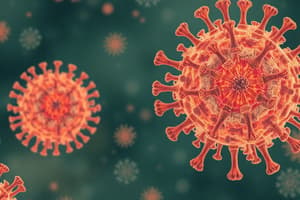Podcast
Questions and Answers
What is the primary mechanism involved in Type II hypersensitivity?
What is the primary mechanism involved in Type II hypersensitivity?
- Antibody binding to self-antigens (correct)
- Immune complex deposition
- T-cell mediated cytotoxicity
- T-helper cell activation
What type of hypersensitivity occurs rapidly after exposure?
What type of hypersensitivity occurs rapidly after exposure?
- Type II hypersensitivity (correct)
- Type I hypersensitivity
- Type III hypersensitivity
- Type IV hypersensitivity
Which cytokine-related phenomenon is characteristic of delayed hypersensitivity reactions?
Which cytokine-related phenomenon is characteristic of delayed hypersensitivity reactions?
- Direct cytotoxic action by antibodies
- Activation of complement system
- Release of cytokines hours after exposure (correct)
- Immediate release of histamines
What type of antigen is considered a 'self' antigen?
What type of antigen is considered a 'self' antigen?
What is NOT a characteristic of Type II hypersensitivity?
What is NOT a characteristic of Type II hypersensitivity?
After how long does the delayed phase of a Type II hypersensitivity reaction typically occur?
After how long does the delayed phase of a Type II hypersensitivity reaction typically occur?
What distinguishes extrinsic antigens from intrinsic antigens?
What distinguishes extrinsic antigens from intrinsic antigens?
Which of the following statements about antigens is true?
Which of the following statements about antigens is true?
Which type of antigen is not a natural part of the body's own cells?
Which type of antigen is not a natural part of the body's own cells?
How are extrinsic antigens typically introduced to an organism?
How are extrinsic antigens typically introduced to an organism?
What is the role of immunoglobulin E antibodies in relation to allergens?
What is the role of immunoglobulin E antibodies in relation to allergens?
How are allergic reactions characterized in terms of their onset?
How are allergic reactions characterized in terms of their onset?
What defines a substance as an allergen?
What defines a substance as an allergen?
Which statement accurately describes the nature of allergic reactions?
Which statement accurately describes the nature of allergic reactions?
What is the primary type of antibodies produced in response to allergens?
What is the primary type of antibodies produced in response to allergens?
Which type of cells recognizes foreign cells in the immune response?
Which type of cells recognizes foreign cells in the immune response?
What is the primary role of B cells in response to a foreign antigen?
What is the primary role of B cells in response to a foreign antigen?
Which cells act as antigen-presenting cells to trigger the B cell response?
Which cells act as antigen-presenting cells to trigger the B cell response?
What process is initiated due to the recognition of cells by macrophages or dendritic cells?
What process is initiated due to the recognition of cells by macrophages or dendritic cells?
In an immune response, the role of antigen-presenting cells is crucial for which type of cellular response?
In an immune response, the role of antigen-presenting cells is crucial for which type of cellular response?
What type of immune response is triggered by specific allergens?
What type of immune response is triggered by specific allergens?
Which cells are primarily involved in the Th2 response during an allergic reaction?
Which cells are primarily involved in the Th2 response during an allergic reaction?
What substance is released during the degranulation of sensitized mast cells?
What substance is released during the degranulation of sensitized mast cells?
Which type of immunoglobulin is primarily involved in the immediate hypersensitivity reaction?
Which type of immunoglobulin is primarily involved in the immediate hypersensitivity reaction?
What is the result of the late-phase allergic reaction that occurs 2–4 hours after exposure?
What is the result of the late-phase allergic reaction that occurs 2–4 hours after exposure?
How are mast cells and basophils activated during an allergic response?
How are mast cells and basophils activated during an allergic response?
Which feature distinguishes IgE from other immunoglobulins in allergic reactions?
Which feature distinguishes IgE from other immunoglobulins in allergic reactions?
What underlies the mechanism of sensitization in type I hypersensitivity?
What underlies the mechanism of sensitization in type I hypersensitivity?
Which types of antigens can be identified by the immune system during the allergic response?
Which types of antigens can be identified by the immune system during the allergic response?
What is the role of cytokines in the late-phase allergic reaction?
What is the role of cytokines in the late-phase allergic reaction?
Flashcards are hidden until you start studying
Study Notes
Allergens and Immune Response
- An allergen is a substance that triggers an allergic reaction.
- Individuals exposed to allergens may produce Immunoglobulin E (IgE) antibodies, leading to allergic diseases.
- Allergic reactions are acquired, rapid, and occur upon re-exposure to specific antigens.
Mechanism of Allergic Reactions
- Th2 Cells Activation: CD4+ Th2 cells stimulate IgE production from B cells.
- Routes of Exposure: Allergens can enter the body via ingestion, inhalation, injection, or direct contact.
- IgE Binding: IgE antibodies bind to receptors on the surface of mast cells and basophils during sensitization to allergens.
Types of Hypersensitivity
-
Type I Hypersensitivity:
- Characterized by rapid allergic reactions within minutes upon exposure to an allergen.
- Involves the degranulation of sensitized mast cells, releasing mediators like histamine and prostaglandins.
- Causes vasodilation, smooth muscle contraction, and can lead to various allergic responses.
-
Type II Hypersensitivity (Cytotoxic Hypersensitivity):
- Involves antibodies produced by the immune response binding to antigens on the surfaces of the body’s own cells.
- Antigens could be intrinsic (self-antigens) or extrinsic (foreign antibodies adsorbed during exposure).
Immune Response to Antigens
- Macrophages or dendritic cells recognize and present the antigens to B cells.
- This process triggers a B cell response, resulting in the production of antibodies against the foreign antigen.
Phases of Hypersensitivity Reactions
- Immediate Phase: Occurs within minutes after exposure to an allergen.
- Late Phase: Occurs 2–4 hours post-exposure, marked by the release of cytokines, contributing to prolonged inflammation and symptoms.
Studying That Suits You
Use AI to generate personalized quizzes and flashcards to suit your learning preferences.





